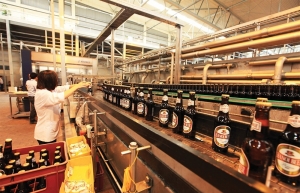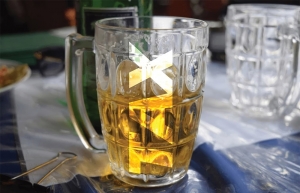A holistic approach to the increase of special consumption tax on beer and spirits
 |
| The conference being live-streamed on VIR's websites and social media platforms |
Speaking at a VIR conference themed “Tax Amendments to Promote Business Activities", Bui Ngoc Tuan, deputy director general of tax advisory services at Deloitte Vietnam, said that the special consumption tax is an indirect tax passed off to the consumer as part of the price of a product or service. The SCT plays a role in regulating society and the macroeconomy. As an efficient tool to increase budget revenue, the SCT accounted for 8.3-9.7 per cent of the total state budget from 2017 to 2023. It creates significant revenue as it is easy to collect with a high tax on certain items such as cigarettes, beer, spirits, and cars, which are in high demand.
By imposing a high tax on luxury goods or high-demand products consumed by wealthy people, it helps narrow the gap between the rich and the poor. It also acts as a management tool to guide production and consumption trends in society, indirectly supporting healthcare policies.
For the beer and spirits industry, Vietnam uses a relative tax calculation method. It is easy to manage by regulatory bodies and easy to calculate by taxpayers. It also helps control consumption, but it may be unfair to calculate the SCT for products with different alcohol content.
According to estimations by the World Health Organisation (WHO), taxes and fees account for 30 per cent of retail prices in Vietnam. The rate is from 40-445 per cent in developed countries, so the WHO has recommended the government increase taxes and fees for beer and spirits by another 10 per cent. This is one of the reasons why the Ministry of Finance and its drafting committee have proposed increasing the SCT for alcohol to 100 per cent by 2030.
"However, we think this rate is quite high, and the plan is unreasonable. From the perspective of consumers, the increase in retail prices of beer and alcohol will change consumption behaviour. It may reduce the number of consumers and the consumption volume. However, the beer and spirits industry makes a significant contribution to the state revenue. In 2023, the industry contributed 3.8 per cent of tax revenue, compared with 9.2 per cent of the total items subject to the SCT," Tuan said.
He highlighted the importance of taking a holistic approach to this issue. "Increasing the SCT will affect the recovery of companies in the industry post-pandemic. Meanwhile, some consumers may opt for cheaper, smuggled, and low-quality products, which in turn could affect their health and create more social issues."
 | Beer industry compelled to adjust to potential tax impact Following a stressful few years of slumping demand, the beer industry is taking on even more challenging times, including the potential impact of special consumption tax, which leaves it finding new ways to prosper. |
 | Conflicts apparent regarding proposed consumption tax Beverage industry leaders continue to put across their views on the potential increase in special consumption tax on various beverages. |
 | VIR conference on Special Consumption Tax Law attracts thousands A conference themed “Tax Amendments to Promote Business Activities” held by VIR has attracted thousands of people both online and offline. |
What the stars mean:
★ Poor ★ ★ Promising ★★★ Good ★★★★ Very good ★★★★★ Exceptional
Related Contents
Latest News
More News
- Businesses bouncing back after turbulent year (February 27, 2026 | 16:42)
- PM outlines new tasks for healthcare sector (February 25, 2026 | 16:00)
- Ho Chi Minh City launches plan for innovation and digital transformation (February 25, 2026 | 09:00)
- Vietnam sets ambitious dairy growth targets (February 24, 2026 | 18:00)
- Masan Consumer names new deputy CEO to drive foods and beverages growth (February 23, 2026 | 20:52)
- Myriad risks ahead, but ones Vietnam can confront (February 20, 2026 | 15:02)
- Vietnam making the leap into AI and semiconductors (February 20, 2026 | 09:37)
- Funding must be activated for semiconductor success (February 20, 2026 | 09:20)
- Resilience as new benchmark for smarter infrastructure (February 19, 2026 | 20:35)
- A golden time to shine within ASEAN (February 19, 2026 | 20:22)

 Tag:
Tag:



















 Mobile Version
Mobile Version